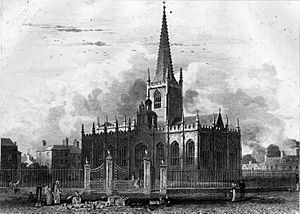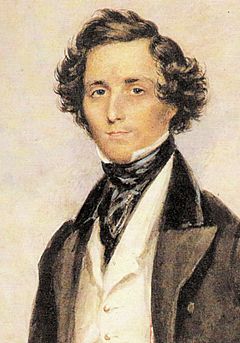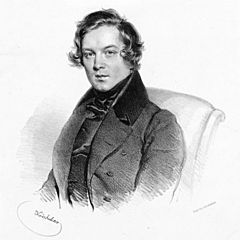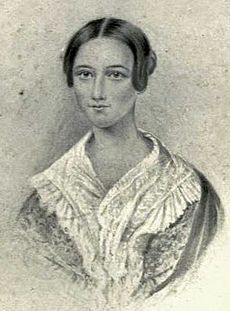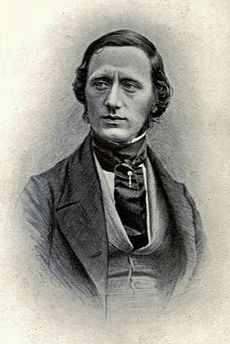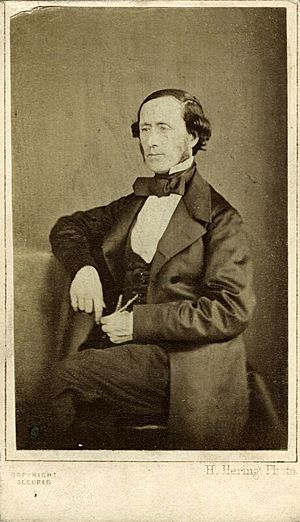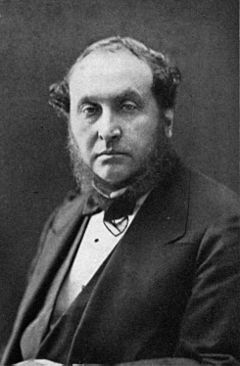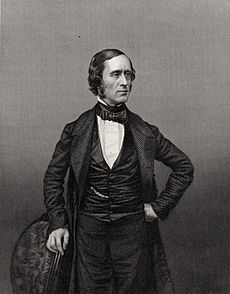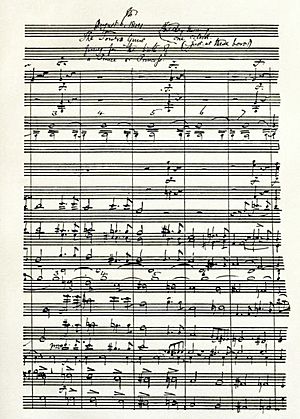William Sterndale Bennett facts for kids
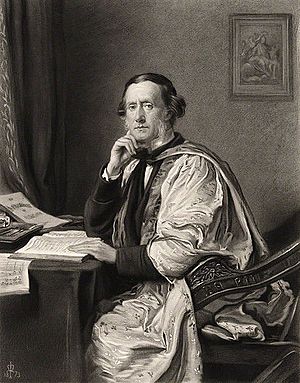
Sir William Sterndale Bennett (born April 13, 1816 – died February 1, 1875) was a famous English musician. He was a composer, a pianist, a conductor, and a music teacher.
When William was ten years old, he joined the Royal Academy of Music (RAM) in London. He stayed there for ten years. By the time he was twenty, he was known as a great concert pianist. His music also received high praise. The German composer Felix Mendelssohn was very impressed by Bennett. Mendelssohn invited him to Leipzig, Germany. There, Bennett became friends with Robert Schumann. Schumann also admired Bennett's music. Bennett spent three winters in Leipzig, writing music and performing.
In 1837, Bennett started teaching at the RAM. He taught there for twenty years. Later, he also taught at Queen's College, London. Some of his famous students included Arthur Sullivan and Hubert Parry. During the 1840s and 1850s, he didn't compose much new music. But he still performed as a pianist. He also led the Royal Philharmonic Society for ten years. He helped organize many chamber music concerts.
In 1858, Bennett started composing again. His later works were popular, but some thought they sounded a bit old-fashioned. From 1856 to 1875, he was a Professor of Music at the University of Cambridge. In 1866, he became the head of the RAM. He saved the school from closing down. He stayed in this job until he died. He was knighted in 1871, which means he received the title "Sir." William Sterndale Bennett died in London in 1875. He was buried in Westminster Abbey.
Bennett had a big impact on English music. He was not just a composer. He was also a great teacher. He helped improve music education. He was a very important person in London's music scene. Recently, people have started to appreciate his music more. Many of his works have been recorded. These include a symphony, his piano concertos, and piano pieces. In 2016, which was 200 years after his birth, many concerts of his music were held.
Biography
Early Life and Education (1816–1836)
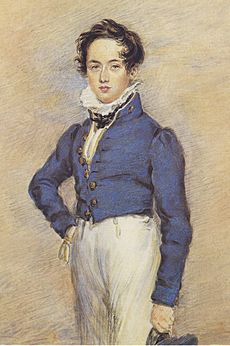
William Sterndale Bennett was born in Sheffield, Yorkshire. He was the third child and only son of Robert Bennett. His father was the organist at Sheffield parish church. Robert Bennett was also a conductor, composer, and piano teacher. William's mother died in 1818. His father died in 1819. So, William became an orphan at age three.
His grandfather, John Bennett, raised him in Cambridge. John Bennett was a professional singer. He sang in the choirs of King's, St John's, and Trinity colleges. William received his first music lessons from his grandfather. In 1824, young William joined the choir of King's College Chapel, Cambridge. He sang there for two years.
In 1826, at age ten, he was accepted into the Royal Academy of Music (RAM). The examiners were so impressed by his talent that they let him study for free. Bennett was a student at the RAM for the next ten years. At first, he studied the violin. Later, he focused on the piano. He also studied composition.
One of Bennett's student compositions was his first piano concerto. It was performed publicly in Cambridge in 1832. Bennett was the piano soloist. Soon after, he played it in London and for King William IV at Windsor Castle. The RAM even published his concerto. In 1833, Felix Mendelssohn heard Bennett play in London. Mendelssohn was very impressed. He invited Bennett to a music festival in Germany. Bennett asked if he could be Mendelssohn's student. Mendelssohn replied, "No, no. You must come to be my friend."
In 1834, Bennett became the organist at St Ann's in Wandsworth, London. He held this job for a year. After that, he taught private music lessons. In 1835, he performed his Second Piano Concerto with the Royal Philharmonic Society. The next year, he premiered his Third Concerto there. Bennett also joined the Society of British Musicians. This group helped promote British musicians and their music.
Time in Germany with Mendelssohn and Schumann (1836–1842)
In May 1836, Bennett traveled to Düsseldorf, Germany. He went with his friend, music critic J. W. Davison. They attended a music festival to hear Mendelssohn's oratorio St Paul. Bennett was inspired by his trip along the Rhine River. He started working on his overture The Naiads. Mendelssohn later wrote that Bennett was "the most promising young musician I know."
Bennett then made three longer visits to Leipzig, Germany. During his first visit (1836-1837), he played his Third Piano Concerto with Mendelssohn conducting. He also conducted his Naiads overture. Bennett became good friends with Robert Schumann. They went on long walks and visited taverns together. Schumann admired Bennett's music very much. In 1837, Schumann dedicated his Symphonic Studies to Bennett. Bennett dedicated his Fantasie, Op. 16, to Schumann. Schumann wrote an essay praising Bennett's music. However, Bennett thought Schumann's music was "rather too eccentric."
Bennett returned to London and taught at the RAM. He made two more trips to Germany. On his third trip in 1842, he played his Caprice for piano and orchestra in Leipzig. Even though he was well-liked in Germany, Bennett chose to stay in England.
Teacher and Conductor (1842–1866)
Bennett returned to London in 1842 and continued teaching at the RAM. In 1843, he started a series of chamber music concerts in London. These concerts featured piano trios and string sonatas. He wanted to bring this type of music, which was popular in Germany, to London.
In 1844, Bennett married Mary Anne Wood. After his marriage, he spent less time composing. He focused more on teaching and organizing music events. One writer noted that Bennett spent too much time giving private lessons. This made it hard for him to keep up with new music trends.
From 1842, Bennett was a director of the Philharmonic Society of London. He helped the society financially. He convinced Mendelssohn to perform with their orchestra. In 1842, the orchestra performed Mendelssohn's Third Symphony in London. From 1846 to 1854, Michael Costa was the conductor. Bennett did not like Costa's focus on Italian opera. He preferred German classical music. This led to disagreements between them.
In 1848, Bennett joined the staff at Queen's College, London. He wrote thirty Preludes and Lessons for his piano students there. These pieces were published in 1853. They were used by music students for many years. Bennett also continued to perform as a soloist. He gave annual chamber music and piano recitals. He often played music by Johann Sebastian Bach and Ludwig van Beethoven.
In 1847, Mendelssohn died. This was a great loss for Bennett. The next year, Bennett had a big argument with Costa. It was about how Costa conducted Bennett's overture Parisina. This disagreement caused a lasting break between them. Bennett resigned from the Philharmonic Society.
Leading Music Organizations (1849–1866)
Bennett became more and more involved in organizing music events. In 1849, he became the first president of the Bach Society in London. Under his leadership, the Society gave the first English performance of Bach's St Matthew Passion in 1854.
For the Great Exhibition in 1851, Bennett helped organize the music for the opening ceremony. In 1853, Bennett performed his Fourth Piano Concerto. This was his last public performance as a soloist with an orchestra. In the same year, he turned down an offer to become the conductor of the Leipzig Gewandhaus Orchestra in Germany. He felt it was his duty to stay in England.
In 1856, Bennett was elected to lead the Philharmonic Society. He held this position for ten years. At his first concert, Clara Schumann, the wife of his old friend Robert Schumann, was the piano soloist. It was her first performance in England.
Leading the Philharmonic Society was not always easy for Bennett. Many orchestra members also played for the Italian Opera House. They were loyal to Costa. Costa often scheduled rehearsals that made it hard for musicians to play for Bennett. This made Bennett seem less in charge.
In March 1856, Bennett became Professor of Music at the University of Cambridge. He improved how music degrees were given. He made students take oral exams. He also required doctorate candidates to first earn a Bachelor of Music degree. In 1858, he received an Honorary Fellowship from the College of Organists.
After 1855, Bennett started composing more. He wrote a cello sonata, a cantata called The May Queen (1858), and an Ode for the 1862 International Exhibition in London. He also wrote a symphony in G minor and a sacred cantata, The Woman of Samaria (1867). Many of these works were composed during his summer holidays.
In 1858, there was another conflict involving Costa. The Earl of Westmorland, who founded the RAM, arranged a concert without the Academy's directors. Bennett resigned from the RAM because of this. He did not return until 1866. In 1862, Bennett's wife died after a long illness. Friends said he never fully recovered from her death. In 1865, Bennett visited Leipzig again. His Symphony Op. 43 was performed there.
Head of the Royal Academy of Music (1866–1875)
In 1866, the head of the RAM, Charles Lucas, retired. The job was offered to Costa, but he asked for too much money. Then it was offered to Otto Goldschmidt, who was a piano professor at the RAM. He turned it down and suggested Bennett. Goldschmidt's wife, Jenny Lind, said Bennett "is certainly the only man in England who ought to raise that institution."
Bennett found that leading a major music college took a lot of his time. The job was usually not too demanding. He only had to work six hours a week, teaching composition. But Bennett had to save the RAM from closing. The government had given the RAM money in 1864 and 1865. But the new Chancellor, Benjamin Disraeli, refused to continue the grants. The RAM directors decided to close the school. Bennett, with support from teachers and students, took over as chairman of the board.
Bennett worked hard to get the government grant back. He also improved the school's finances. He dealt with difficult talks about the future of music education in England. The RAM was not doing well in 1866. It had a poor reputation and financial problems. But under Bennett's leadership, the RAM's reputation and popularity grew. The number of students increased steadily. In 1868, there were 66 students. By 1872, there were 176.
Bennett received honorary degrees from Cambridge (1867) and Oxford (1870) universities. The Philharmonic Society gave him its Beethoven gold medal in 1867. In 1871, Queen Victoria knighted him. In 1872, he received a public tribute in London. The money raised from this event created a scholarship and prize at the RAM, which is still given today.
Bennett died at age 58 on February 1, 1875, in London. He was buried in Westminster Abbey, near the tomb of Henry Purcell. A song from his cantata The Woman of Samaria was sung at his funeral. The Philharmonic Society's first concert after his death honored him. It included music from his unfinished work for Ajax and The Woman of Samaria.
Family
Bennett's son, James Robert Sterndale Bennett, wrote a book about his father. Many of Bennett's descendants became musicians or performers. These include his grandsons Robert and Tom (T.C.) Bennett. Tom's daughter, Joan Sterndale-Bennett, was a well-known actress. Ernest Sterndale Bennett was a theater director in Canada. Charlie Simpson, a member of the bands Busted and Fightstar, is also a descendant.
Music
Musical Style
Many experts believe Bennett used Mozart as his musical model. His best music was full of emotion, but it was also very controlled. He was mainly a composer for the piano.
Bennett's piano playing was very expressive. People said it had a "fire and energy" that wasn't always obvious in his gentle music. Famous musicians like Clara Schumann praised his performances.
Bennett was careful about the music of other European composers, except for Mendelssohn. He was not a fan of the "new school" of music. He didn't like Robert Schumann's music much. He also didn't think highly of Richard Wagner's music. He said he "entirely misunderstand[s] him."
Early Compositions
Bennett's early music is often considered his best. By the time he first visited Germany in 1836, he had already written five symphonies and three piano concertos. His early songs are described as beautiful and well-crafted.
His piano works are thought to be his finest. He avoided showing off with difficult passages. Instead, he created his own style. It was classical but also showed influences from the music he performed. Robert Schumann praised Bennett's early piano works.
Later Works
Bennett's musical style did not change much after his early years. Some critics felt his later works sounded old-fashioned. They thought his music from the 1850s and 1860s could have been written much earlier.
His cantatas, The May Queen and The Woman of Samaria, were very popular in their time. However, some critics now say they were not his best work. The Woman of Samaria shows Bennett was a skilled composer. But some found it lacked excitement. The May Queen overture is praised, but the rest of the work is considered less interesting. These works were popular because they fit the musical tastes of the time.
Edited Works and Writings
Bennett edited keyboard music by Beethoven and Handel. He also helped edit the Chorale Book for England (1863). He oversaw the first British printed edition of Bach's St Matthew Passion. He also edited Bach's The Well-Tempered Clavier and Handel's Acis and Galatea.
Bennett gave lectures at Cambridge and the London Institute. The texts of his lectures were published in 2006. He often played music during his lectures. This made him a pioneer of the "lecture-recital."
Legacy
Sir John Betjeman called Bennett "Queen Victoria's Senior Musical Knight." Bennett is considered the most important British composer of the early Victorian era.
Bennett's students had a big impact on British music in the late 19th and early 20th centuries. These students included Arthur Sullivan, Hubert Parry, and Tobias Matthay. Bennett helped raise the standards of music training at Cambridge and the RAM. This had a huge effect on music in England.
Through his concerts, Bennett introduced many different kinds of chamber music to London audiences. He also helped change how British people viewed Bach's music. At first, newspapers described Bach's music as "grandeur there is, but no beauty." But Bennett kept promoting it. A turning point was when Prince Albert attended Bennett's performance of the St. Matthew Passion in 1858.
Bennett left behind a large music library. Many of his compositions have been recorded on CD. These include symphonies, overtures, piano concertos, and songs. In 2016, to celebrate 200 years since his birth, many concerts and events were held. He was also featured as 'Composer of the Week' on BBC Radio 3.
Quotes
- You can learn to sing or to play an instrument, you can make your spouse out of music, but you’ll be never able to emulate the greatest of all symphonies, the one that pattering rain and vigorous wind create in the long winter nights.
- I must admit I envy scientists. Unlike the vast majority of us, they can speak the language of truth and, while they engage in conversation with God, the universe flows between their fingers
- There is no doubt: the only purpose of a good teacher is to see his student becoming better than him. If this does not occur, he has wasted his gift.
See also
 In Spanish: William Sterndale Bennett para niños
In Spanish: William Sterndale Bennett para niños
 | Precious Adams |
 | Lauren Anderson |
 | Janet Collins |


